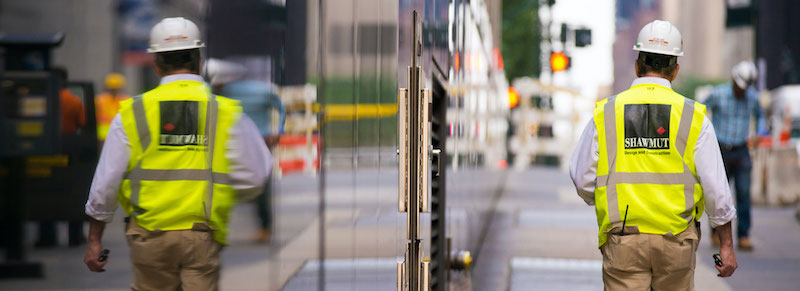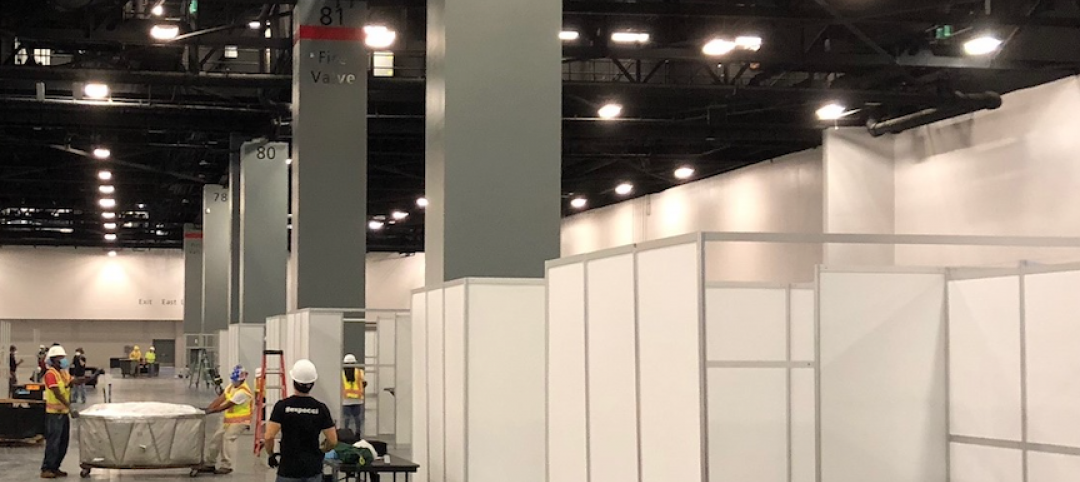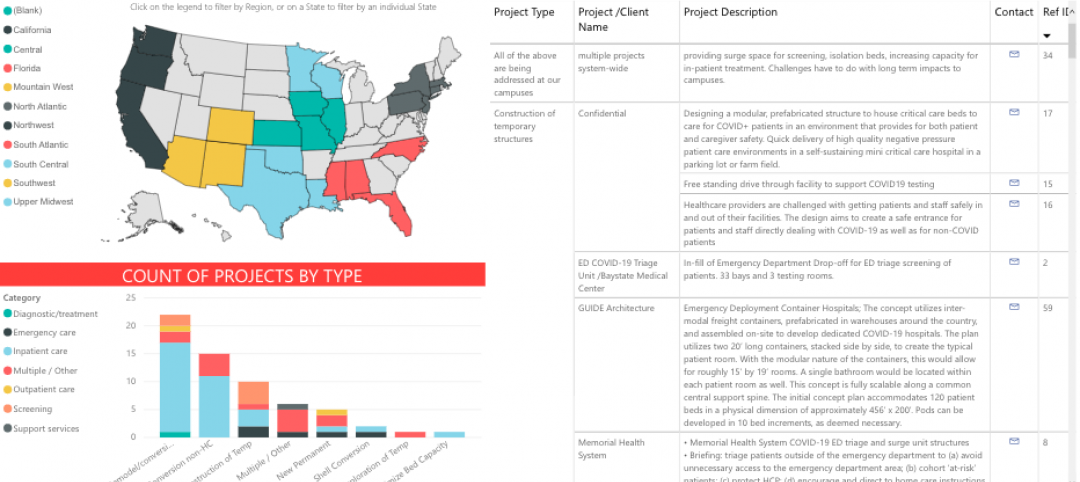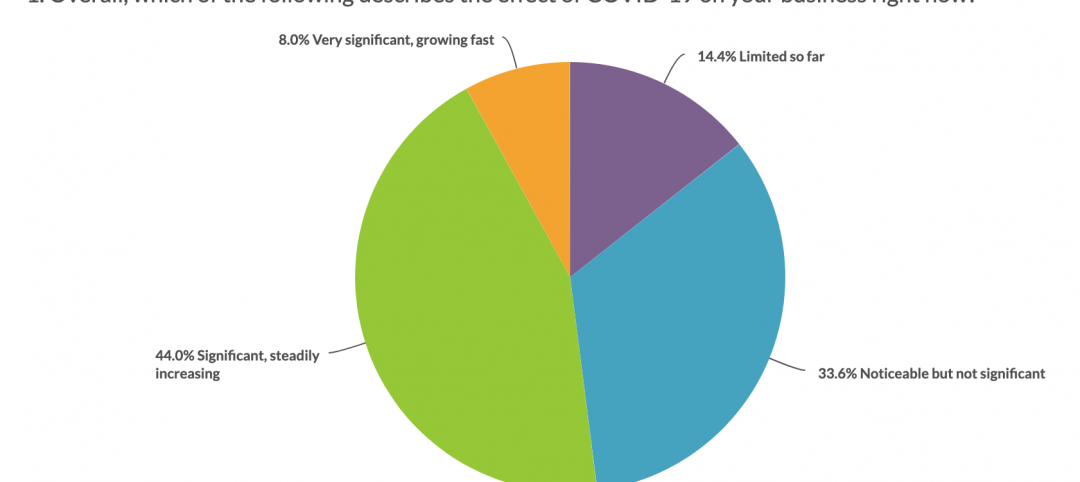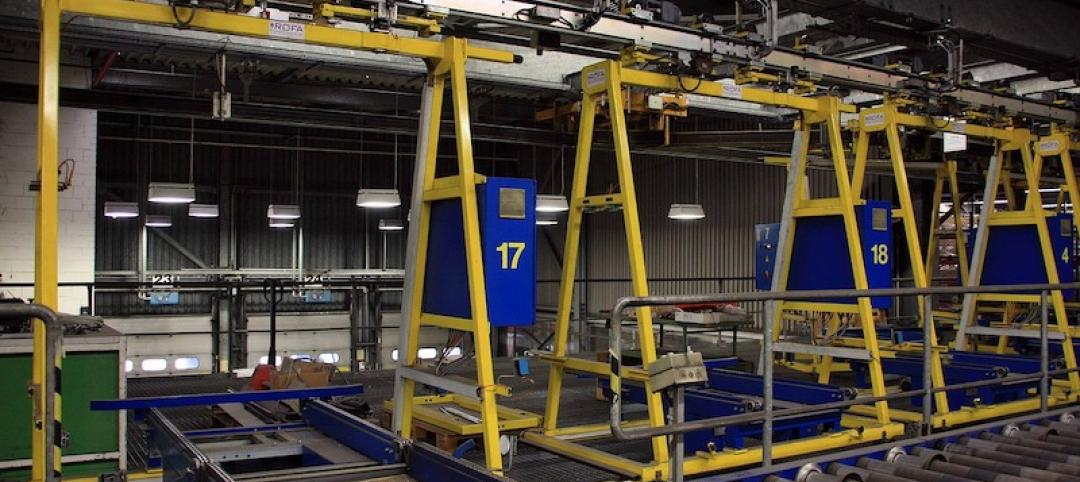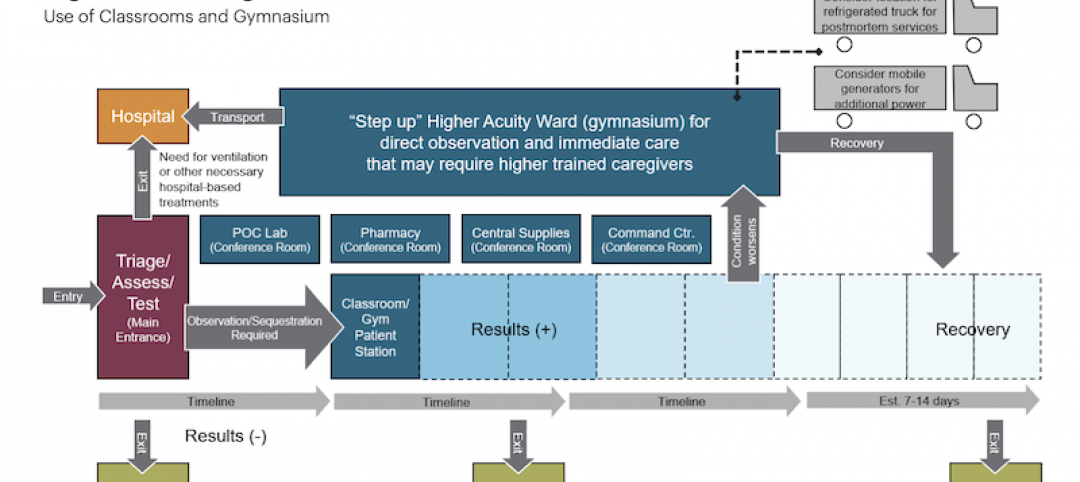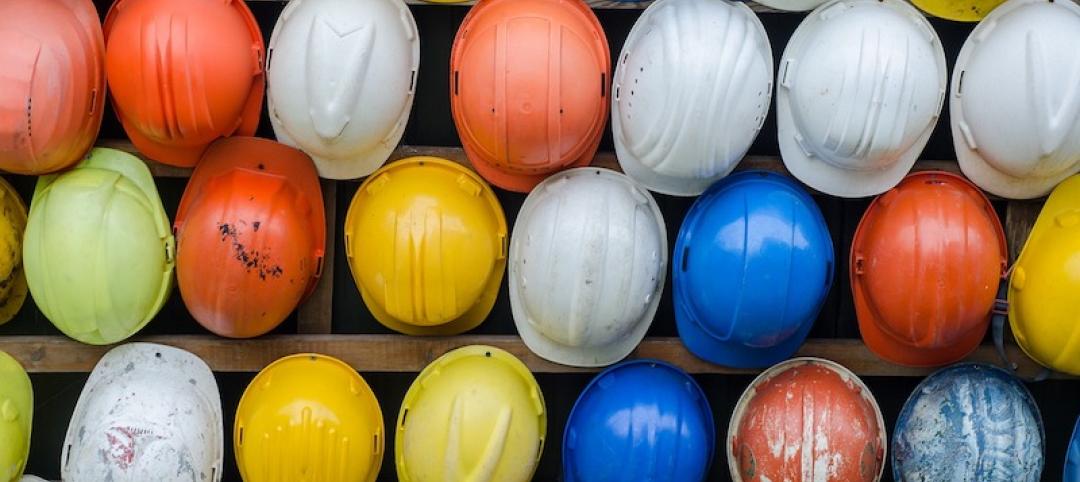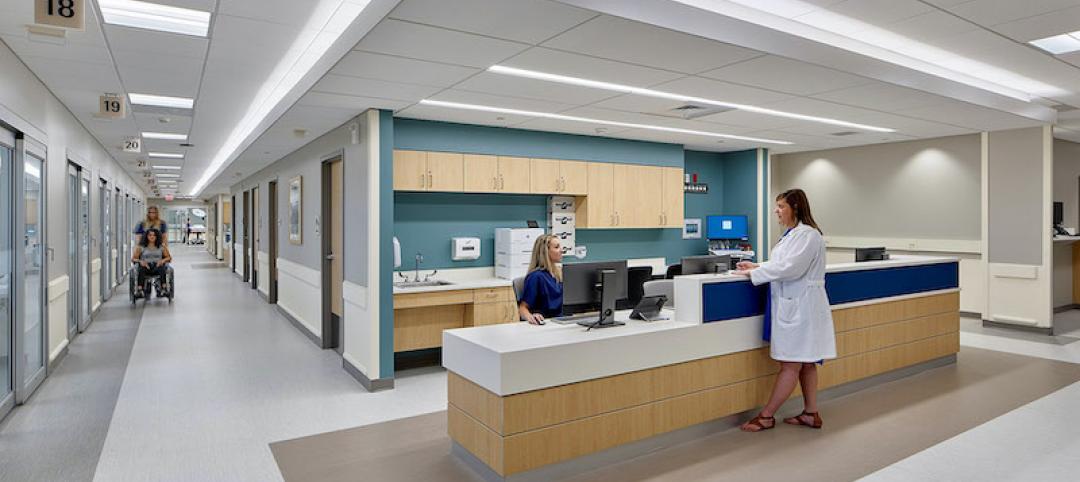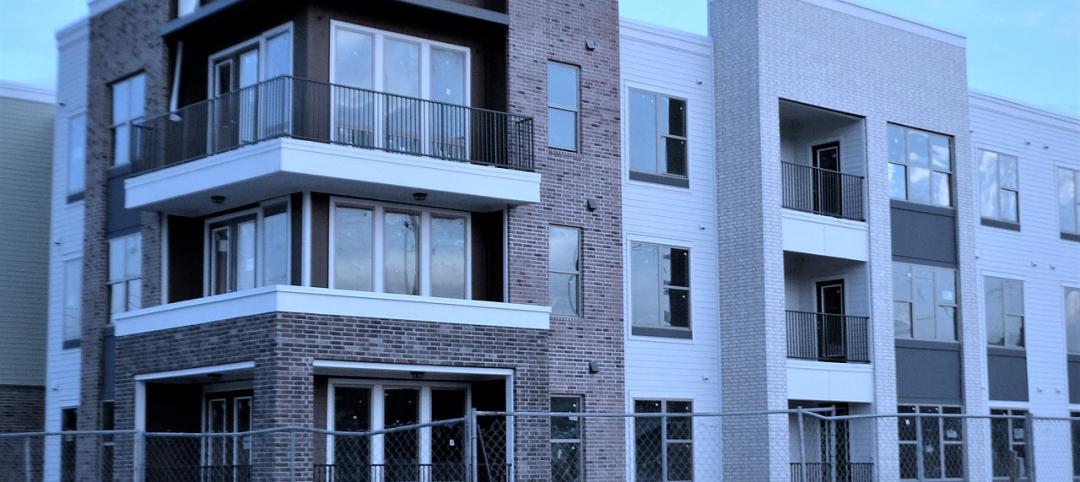As states start reopening their economies, and building reactivates, construction firms are giving more serious thought to how they can provide a safer environment for their employees and subs.
Boston-based Shawmut Design and Construction, in collaboration with trade unions, industry peer groups, and other firms, has rolled out a COVID-19 safety plan for its project sites across the country.
“The coronavirus has very quickly required a drastic change to the world, and specifically, to our construction industry,” says Les Hiscoe, Shawmut’s CEO. “Through technology partnerships, pilot programs, and grassroots innovation by our project team members in the field, we have created efficient, enhanced safety guidelines. Protecting our employees and everyone on our jobsites is our top priority, so we are engaging in real-time, adapting to our new environment’s requirements almost instantly, and never missing a beat.”
SHAWMUT MAXIMIZES TECHNOLOGY PLATFORMS
The plan includes safety protocols, new jobsite innovation, and COVID-19 risk assessment and response. Shawmut has developed a new custom technology platform that’s designed to check for COVID-19 symptoms and to manage contact tracing.
Called Shawmut Vitals, the platform allows employees and subs to self-certify daily health screenings by scanning a job-specific QR code, and then filling out a health survey. Employees who are symptomatic or have been exposed to someone who’s infected or at-risk will be flagged for further care or action.
Team members can access information on their mobile devices.
Also See: Nonresidential construction spending declines in March as pandemic halts projects
Shawmut has also mobilized platforms and technologies like SmartVid.io and Feevr to monitor safety compliance, enforce social distancing, and screen personnel for fevers.
The firm’s plan outlines stringent guidelines for self-awareness and reporting. A dedicated COVID-19 officer will be on site 100% of the time to enforce protocols, which include limiting any worker gatherings to no more than five people. Crews might be minimized and work shifts staggered.
Health screening guidelines, self-reporting, and all best practices will be reviewed regularly and reinforced with on-site signage, written in English and Spanish and located in high-traffic areas. Shawmut will ensure that an adequate amount of hand-washing stations will be available throughout all sites, with each unit at least six feet apart. For tasks that require more than one person for completion, additional PPE will be required.
JOBSITE INFECTION CONTROL REQUIRES EDUCATION AND TRAINING
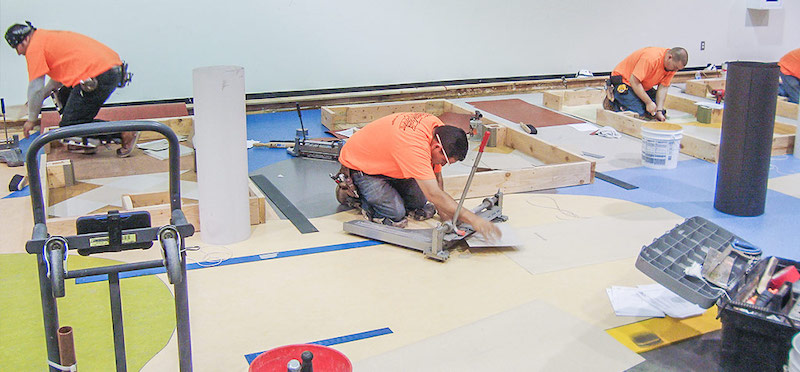
Following infection-control guidelines has been central to the safety and health of flooring installation professionals. Image: International Standards and Training Alliance
John T. McGrath, Jr., Executive Director of the International Standards and Training Alliance (INSTALL), an industry-endorsed floorcovering installation training and certification program, points out in a recent essay that floorcovering professionals have long understood the importance of health and safety on the jobsite, as spelled out in Infection Construction Risk Assessment (ICRA) standards and protocols, which are now being applied to battle the spread of COVID-19.
Compliance with ICRA standards and protocols helps safeguard patients from potential contaminants during renovation or construction of healthcare projects.
McGrath points out that the United Brotherhood of Carpenters’ ICRA course teaches techniques for containing pathogens, controlling airflow, protecting patients, and for completing work without disrupting adjacent operations.
As COVID-19 began to spread in North America, the union worked with ICRA to expedite an online short course for contractors in the field. INSTALL (which is the union’s floorcovering arm) works with contractors to employ ICRA so construction teams can classify work areas to minimize risk, adhere to protocols, and communicate to the facility’s team.
COVID-19 RELATED PRIORITIES FOR CONTRACTORS AND EMPLOYEES
Different states had different criteria for allowing construction to proceed during the pandemic. In markets where construction was deemed essential, “ICRA certification has played a major role in helping healthcare systems find and specify trained contractors in [their] region,” says DeAnn Richards, Infection Preventionist and ICRA Consultant, North Central States Regional Council of Carpenters.
Also See: Apartment Firms’ Reactivation Plans Begin to Take Shape
Jayson Karas, that Council’s ICRA Facilitator, notes that major contractors with ICRA training and experience have stepped up to create a roundtable and discussion forum within the six-state region. “They were prepared ahead of time for this crisis by working with hospital networks to take stock of PPE and necessary equipment like HEPA filters,” Karas states.
Rick Okraszewski, Industry Outreach/ICRA (retired) for the Eastern Atlantic States Regional Council of Carpenters, says that his Council has provided training for more than a dozen years. “The new curriculum adds nuance surrounding COVID-19,” he says.
Aside from ICRA compliance, McGrath says there are some simple procedures that construction professionals can follow to curtail the spread of disease on jobsites. The first step, he says, is to develop a COVID-19 response team with representations from all levels of the organization. Contractors should also create a company specific COVID-19 response plan, and ensure that each jobsite has a safety committee.
Prohibit gatherings of more than 10 people, and provide necessary hygienic supplies including handwashing stations, cleaning/disinfectant solutions, portable toilets, and barrier-free trash receptacles.
McGrath adds that one of the most important things that foremen and project managers can do right now is to monitor employee health and send ill workers home. They should also ensure that common areas and items are cleaned and disinfected regularly.
Related Stories
Coronavirus | Apr 9, 2020
COVID-19 Design Innovation Grant: IDA offers $14,000 to spur design innovation for combating the coronavirus pandemic
The International Design Awards is looking for innovations in low-cost ventilators, in-home isolation pods, and reusable masks.
Coronavirus | Apr 9, 2020
COVID-19 alert: Robins & Morton to convert Miami Beach Convention Center into a 450-bed field hospital
COVID-19 alert: Robins & Morton to convert Miami Beach Convention Center into a 450-bed field hospital
Coronavirus | Apr 8, 2020
AIA task force launches tool for assessing COVID-19 alternative care sites
The tool is intended to assist non-healthcare design professionals with identifying alternative sites suitable for patient care.
Coronavirus | Apr 8, 2020
COVID-19 alert: Most U.S. roofing contractors hit by coronavirus, says NRCA
NRCA survey shows 52% of roofing contractor said COVID-19 pandemic was having a significant or very significant impact on their businesses.
Coronavirus | Apr 8, 2020
Navigate supply chain and manufacturing challenges during disruption
First, most important and most complex: Create an extensive safety plan for your facilities and job sites that protects both the personnel onsite and the end users of your product.
Coronavirus | Apr 7, 2020
How to turn a high school into a patient care center in 15 days
HKS’s concept paper presents three scenarios.
Coronavirus | Apr 7, 2020
New Trump administration guidance now allows firms with 500 of fewer employees to qualify for paycheck protection program loans
Associated General Contractors of America secures fix to loan qualifications after alerting administration officials to small business administration language that excluded many firms.
Coronavirus | Apr 6, 2020
New small business administration loan guidance appears to exclude many construction firms that employ fewer than 500 people
Construction officials urge agency to make clear that firms that employ 500 or fewer people to qualify for paycheck protection program loans, regardless of revenue.
Coronavirus | Apr 6, 2020
Pandemic preparedness: How hospitals can adapt buildings to address worst-case scenarios
A Canadian healthcare architect looks at how hospital staff can act now to modify facilities and contain a pandemic.
Coronavirus | Apr 5, 2020
COVID-19: Most multifamily contractors experiencing delays in projects due to coronavirus pandemic
The NMHC Construction Survey is intended to gauge the magnitude of the disruption caused by the COVID-19 outbreak on multifamily construction.


